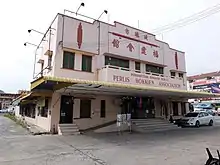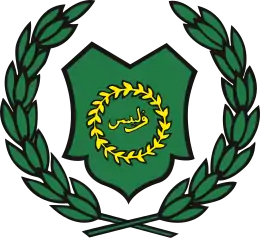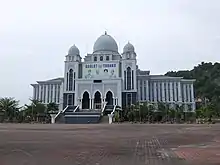Perlis
Perlis[note 1] (Kedah Malay (Perlis dialect): Peghelih), also known by its honorific title Perlis Indera Kayangan, is a state of Malaysia in the northwestern coast of Peninsular Malaysia. It is the smallest state in Malaysia by means of area and population, as well as the northernmost in the country. The state borders the Thai provinces of Satun and Songkhla to the north and the Malaysian state of Kedah to the south. Perlis is the only Malaysian state that is not divided into any districts, due to its small size, but it is still divided into several communes.[8] It was called Palit (Thai: ปะลิส) by the Siamese when it was under their influence. Perlis had a population of 227,025 as of the 2010 census.[1]
Perlis
Peghelih | |
|---|---|
| Other transcription(s) | |
| • Jawi | ڤرليس |
| • Chinese | 玻璃市 |
| • Tamil | பெர்லிஸ் Perlis (Transliteration) |
| • Thai | ปะลิส |
| Nickname(s): Perlis Indera Kayangan ڤرليس ايندرا کايڠن | |
| Anthem: Amin, Amin, ya Rabaljalil Amen, Amen, o Majestic Lord | |
 | |
OpenStreetMap | |
| Coordinates: 6°30′N 100°15′E | |
| Capital (and largest city) | Kangar |
| Royal capital | Arau |
| Government | |
| • Type | Parliamentary constitutional monarchy |
| • Raja | Sirajuddin |
| • Menteri Besar | Mohd. Shukri Ramli (PN-PAS) |
| • Leader of the Opposition | Gan Ay Ling (PH-PKR) |
| Area | |
| • Total | 819 km2 (316 sq mi) |
| Highest elevation (Mount Perlis) | 733 m (2,405 ft) |
| Population (2019)[2] | |
| • Total | 254,400 |
| • Density | 310/km2 (800/sq mi) |
| Demonym | Perlisian |
| State Index | |
| • HDI (2019) | |
| • GDP (2019) | |
| • Per capita (2019) | |
| Postal code | 01xxx to 02xxx |
| Calling code | 04 |
| ISO 3166 code | MY-09 |
| Vehicle registration | R |
| Establishment of Kota Sena as capital of Kedah | 1653 |
| Vassal state of Siam governed by Raja Long Krok | 1839[5] |
| Kingdom formed when Syed Hussain appointed as King by Siam[6] | 20 April 1843 |
| Accession into the Federation of Malaya | 1 February 1948 |
| Independence as part of the Federation of Malaya | 31 August 1957 |
| Website | www |
Perlis experiences a tropical monsoon climate. Much of the state's highlands are part of the Nakawan Range, a subrange of the Tenasserim Hills system that spans through southern Myanmar, Southern Thailand and Peninsular Malaysia, with Mount Perlis as the highest point at 733 m. The Nakawan also forms a natural frontier between the state and Thailand.
The capital of Perlis is Kangar, and the royal capital is Arau. Another important town is Padang Besar, at the Malaysia–Thailand border and Kuala Perlis, the ferry town to Langkawi. The main port and ferry terminal is at the small village of Kuala Perlis, linking mostly to Langkawi Island. Another important lately developed area is Pauh Putra within the subdistrict of Kurong Anai which houses the main campus of Malaysia University of Perlis[9] and Politeknik Tuanku Syed Sirajuddin. Perlis has a famous snake sanctuary and research centre at Sungai Batu Pahat. Perlis State Park and Gua Kelam are among the popular tourist attractions.
Etymology
The origin of the toponym 'Perlis' is vague. However, there are several theories:
- According to a Malaysian historian, Mohd Yusuf bin Adil, the name comes from the Thai phrase "phrao loi" (Southern Thai: พร้าวลอย) which means kelapa hanyut (coconut washed ashore) since there were many coconuts found on the shores of Kuala Perlis. The phrase has been shortened by locals until it sounded like "pereleh" or Perlis.
- It has also been suggested Perlis may be a shortened form of a Malay word "peroleh" (obtain) as the state was a "gift" from Kedah, since it was a part of Kedah before becoming a state on its own.
- According to Negeri Perlis Indera Kayangan: Sejarah Pembentukan Sebuah Negeri Berdaulat by Ahmad Ismail, the name comes from a tree of the same name, which may have gone extinct.
- Some researches suggests the name is derived from a Northern Malay dialect word "perelus" which roughly translates as "foot falling into a crack", since Perlis is said to have a wide land filled with mud, and the people's feet may sink into the mud.[10]
- Additional suggestions include being named after someone, or derived from the French word "perlite" which means "rock" due to a huge rock near Sungai Perlis.[11]
The honorific "Indera Kayangan" was given by Tuanku Raja Syed Hussin Jamalullail (who ruled Perlis from 1843 to 1873) after the royal town of Indera Kayangan II (1797 until 1813) he was raised in now located in Kampung Langgar, Kayang within the Kuala Perlis area.[12] However, this epithet became less popular under the recommendation of Tuanku Syed Sirajuddin Putra Jamalullail in 2015, in which according to him is inline with the official singular name given in the state constitution his father signed without any long epithets in general "which is related to deities, or any 'Darul'..."".[7]
History
Perlis was originally part of Kedah, although it occasionally came under rule by Siam or Aceh. Perlis was historically an important realm within the Kingdom of Kedah. Sultan Muhyiddin of Kedah made his capital in Kota Sena, while Sultan Dhiauddin II made Kota Indera Kayangan his capital.[14] Sultan Dhiauddin II of Kedah was honorifically titled as Raja Muda of Perlis and Kedah,[15][16] akin to the title Prince of Wales in the United Kingdom. During his reign as the Sultan of Kedah, he oversaw a treaty with George Leith to cede Province Wellesley to Penang. He was titled as Raja Muda of Perlis and Kedah.[17] This fact depicted Perlis was a special realm within the Kedah sultanate.
Sultan Dhiauddin then made Syed Harun Jamalullail, father of the future first Raja of Perlis as chieftain of Arau as a wedding gift to his marriage with his daughter, Tengku Sofiah. Syed Harun's descendant will eventually become deputy governor (1839) and Raja of Perlis.[18]
After the Siamese conquered Kedah in 1821, the British felt their interests in Perak to be threatened.[19] This resulted in the 1826 Burney and Low Treaties[20] formalising relations between the two Malay states and Siam, their nominal overlord. In the Burney Treaty, the exiled Sultan of Kedah, Ahmad Tajuddin was not restored to his throne. Sultan Ahmad and his armed supporters then fought in a series of war known as Perang Musuh Bisik for his restoration over twelve years (1830–1842).[21] Towards the end of the conflict and the death of Siam's Ligor governor in 1839 (Siam's main authority figure over Kedah), Perlis was separated with Kedah.[19]
In 1842, the Sultan finally agreed to accept Siamese terms and was restored to his throne of Kedah. However, Siam separated Perlis into a separate principality directly vassal to Bangkok. The Siamese made Raja Long Krok as the Governor of Siam in Perlis while Syed (or Sayyid) Hussain Jamalullail as deputy governor. Finally, on 20 May 1843, the Siamese made Sayyid Hussain Jamalulail, the paternal grandson of a Hadhrami Arab Sayyid immigrant and maternal grandson of the Sultan of Kedah, to be the first Raja of Perlis[22] which made Perlis a sovereign state. His descendants still rule Perlis, but as rajas, instead of as sultans.
In 1897, Kedah led by its Prime Minister, Wan Mat Saman began efforts to end the sovereignty of Perlis (similar to what was made to the Kingdom of Kubang Pasu which absorbed into Kedah). After several tense occasions and disputes, Siamese King Chulalongkorn sided with Perlis.[23] Perlis also had several disputes with the state of Setul before the 1900s.
As with Kedah, the Anglo-Siamese Treaty of 1909 forced Siam to relinquish its southern Malay vassal states of Kelantan, Trengganu, and Monthon Syburi (comprising Kedah, Perlis, and Satun (but Satun remained with Thailand)) to Great Britain. The British installed a Resident in the Perlis royal capital of Arau. Perlis was returned to Siam in World War II as a reward for Siam's alliance with Japan, but this brief annexation ended with the Japanese surrender. After World War II, Perlis returned to British rule until it became part of the Malayan Union, then the Federation of Malaya in 1957, and lastly, Malaysia in 1963.
Since 2000, the raja or hereditary monarch has been Tuanku Syed Sirajuddin. He was the Yang di-Pertuan Agong of Malaysia from 13 December 2001 to 12 December 2006.[24] Tuanku Syed Faizuddin Putra was the Regent of Perlis during the five-year period when Tuanku Syed Sirajuddin was Yang di-Pertuan Agong. The Chief Executive or Menteri Besar is currently Mohd. Shukri Ramli of the Perikatan Nasional.
Geography

Perlis is the smallest state in Malaysia, covering a total land area of 819 km². Like other West Coast states, it has a coastline facing the Strait of Malacca, measuring around 20.4 km (12.7 mi) from Kuala Sanglang near the border with Kedah's Kubang Pasu District up north towards the Malaysia-Thailand border near Pos Batu Putih, in the vicinity of Kuala Perlis.
From south to north, its topographical profile consists of flat, arable lands of the Kedah–Perlis Plain dotted with numerous mogotes, and abruptly rises up high as rolling karstic hills of the Nakawan Range, which forms the natural boundary between the state and the province of Satun on the Thai side. In general, paddy fields dominate much of the state's landscape as the Perlisian portion of the Kedah–Perlis Plain had been utilized for rice farming since antiquity. Meanwhile, the Nakawan runs southwest–northeast along the Thai border from Kuala Perlis towards Kaki Bukit. The range is home to the 733-metre tall Mount Perlis, the highest point in the state.
Climate
Along with northern Kedah, the entirety of Perlis experiences tropical monsoon climate (Köppen climate classification: Am).
| Climate data for Kangar | |||||||||||||
|---|---|---|---|---|---|---|---|---|---|---|---|---|---|
| Month | Jan | Feb | Mar | Apr | May | Jun | Jul | Aug | Sep | Oct | Nov | Dec | Year |
| Average high °C (°F) | 30.2 (86.4) |
32.4 (90.3) |
32.4 (90.3) |
31.1 (88.0) |
30.2 (86.4) |
29.9 (85.8) |
29.5 (85.1) |
29.4 (84.9) |
29.1 (84.4) |
28.9 (84.0) |
28.9 (84.0) |
28.9 (84.0) |
30.1 (86.1) |
| Daily mean °C (°F) | 26.4 (79.5) |
27.7 (81.9) |
28 (82) |
27.6 (81.7) |
27.4 (81.3) |
27.4 (81.3) |
27 (81) |
26.9 (80.4) |
26.5 (79.7) |
26.1 (79.0) |
26 (79) |
25.9 (78.6) |
26.9 (80.5) |
| Average low °C (°F) | 23.7 (74.7) |
24.1 (75.4) |
24.8 (76.6) |
25.2 (77.4) |
25.4 (77.7) |
25.3 (77.5) |
25 (77) |
24.8 (76.6) |
24.6 (76.3) |
24.4 (75.9) |
24.3 (75.7) |
24 (75) |
24.6 (76.3) |
| Average precipitation mm (inches) | 48 (1.9) |
44 (1.7) |
121 (4.8) |
171 (6.7) |
205 (8.1) |
161 (6.3) |
167 (6.6) |
196 (7.7) |
220 (8.7) |
272 (10.7) |
218 (8.6) |
129 (5.1) |
1,952 (76.9) |
| Source: Climate-Data.org[25] | |||||||||||||
Government

Perlis is ruled by the House of Jamalullail. Unlike other Malaysian monarchical states, in which the ruler is a "Sultan", the Perlis ruler is called the "Raja".[26]
Legislative power in the state is exercised by the Perlis State Legislative Assembly, a unicameral chamber in which all 15 seats are elected from single-member constituencies. After the 2022 state election, the Perikatan Nasional coalition, led by the Malaysian Islamic Party, holds 14 of the assembly's 15 seats.
Raja appoints Menteri Besar (Chief Minister) and an Executive Council (akin to a Cabinet). Generally, the chief minister is a member of the legislative assembly who can command a majority on the assembly's floor. The Raja's appointment powers were at the centre of a brief constitutional crisis in the state after the 2008 general election. The Raja sought to appoint a Barisan Nasional assemblyman, Md Isa Sabu, as chief Minister despite Prime Minister Abdullah Badawi, who led the national coalition, nominating the incumbent Shahidan Kassim to continue in office. The Raja prevailed, and swore in Md Isa, who proceeded to serve a full term as chief minister.[27]
The state elects three members of the federal House of Representatives, for the constituencies of Arau, Kangar and Padang Besar. After the 2022 general elections, all three seats are held by Perikatan Nasional.
The state also has two federal senators; like all other states, the senators are not directly elected but appointed by a vote of the state legislative assembly.
Perlis, being the smallest state by area in Malaysia, is not divided into administrative districts. Nevertheless, it is still divided into several mukims (communes), namely:

- Abi
- Arau
- Beseri
- Chuping
- Jejawi
- Kaki Bukit
- Kayang
- Kechor
- Kuala Perlis
- Kurong Anai
- Kurong Batang
- Ngulang
- Oran
- Padang Pauh
- Paya
- Padang Siding
- Sanglang
- Sena
- Seriab
- Sungai Adam
- Titi Tinggi (Padang Besar)
- Utan Aji; and
- Wang Bintong
 | |||||
| Affiliation | Coalition/Party Leader | Status | Seats | ||
|---|---|---|---|---|---|
| 2022 election | Current | ||||
| Perikatan Nasional | Mohd Shukri Ramli | Government | 14 | 14 | |
| Pakatan Harapan | Gan Ay Ling | Opposition | 1 | 1 | |
| Total | 15 | 15 | |||
| Government majority | 9 | 9 | |||
Demographics
| Year | Pop. | ±% |
|---|---|---|
| 1970 | 121,062 | — |
| 1980 | 144,782 | +19.6% |
| 1991 | 183,824 | +27.0% |
| 2000 | 198,288 | +7.9% |
| 2010 | 225,630 | +13.8% |
| 2020 | 284,885 | +26.3% |
| Source: [28] | ||

Religion
As of 2010 the population of Perlis is 87.9% Muslim, 10.0% Buddhist, 0.8% Hindu, 0.6% Christian, 0.2% Taoist or Chinese religion followers, 0.2% non-religious, 0.2% unknown / none, and 0.1% followers of other religions.
The Malaysian constitution strictly defines what makes a "Malay", considering Malays those who are Muslim, speak Malay regularly, practise Malay customs, and lived in or have ancestors from Brunei, Malaysia and Singapore.[30] Statistics from the 2010 Census indicate that 83.6% of the Chinese population identify as Buddhist, with significant numbers of adherents following Taoism (3.4%) and Christianity (11.1%), along with small Hui-Muslim populations in areas like Penang. The majority of the Indian population follow Hinduism (86.2%), with a significant minority identifying as Christians (6.0%) or Muslims (4.1%). Christianity is the predominant religion of the non-Malay bumiputera community (46.5%) with an additional 40.4% identifying as Muslims.[31]
Languages
Majority of Perlis' population speaks Perlis Malay which is a sub-dialect of Kedah Malay but also has its own unique features compared to those of neighbouring Kedah. Besides that there is also Hokkien, Mandarin, English, Tamil, Malayalam as well as small numbers of Southern Thai speakers, mostly ethnic Malaysian Siamese. However, large numbers of Perlisians regardless of ethnic origin mainly uses Perlis Malay as a lingua franca. In particular, Perlis is well known for its distinctive Hokkien language, known as Penang Hokkien. Hokkien serves as the lingua franca among the various ethnic Chinese communities in Perlis.
Tourism
Some of the tourist attractions in Perlis are:
.jpg.webp)
- Perlis State Park - Situated on the southern slopes of the Nakawan Range, the park consists of Mata Ayer and Wang Mu Forest Reserves with a total area of about 5,000 ha. Some of the attractions in the park include caves such as the famed Gua Kelam and Gua Wang Burma, which is located within the 500-year-old Setul limestone formation.[32]
- Gua Kelam - A limestone cave that is one of the most visited destinations in Perlis.[33] Located about 33 km north of Kangar, the capital of Perlis, near Kaki Bukit.
- Padang Besar - Located near the Malaysia-Thai border, the town is famed for its duty-free shopping scene.
- Kuala Perlis - One of the popular activities here is fishing. There are also many restaurants that offer fresh seafood that is relatively cheaper than in the capital city.[34]The town is also a transit point for tourists to be ferried to Langkawi.
- Kota Kayang Museum
- Melati Lake Gardens
- Perlis Snake Park
Recreation
There is an outdoor rock climbing area in the limestone hills of Bukit Keteri with over 50 sport climbing routes that are bolted by the world's climbing team; the crags are split into two, both next to each other and the rockfaces rise to 350 m. The range of difficulty is from beginner to expert and many varieties of climbs are available.
See also
References
- "Laporan Kiraan Permulaan 2010". Jabatan Perangkaan Malaysia. p. 27. Archived from the original on 27 December 2010. Retrieved 24 January 2011.
- "Perangkaan Demografi Suku Tahun Pertama". Department of Statistics, Malaysia. 2018. Archived from the original on 12 February 2016. Retrieved 25 May 2015.
- "Subnational Human Development Index (2.1) [Kedah – Malaysia]". Global Data Lab of Institute for Management Research, Radboud University. Retrieved 22 December 2019.
- "Department of Statistics Malaysia Official Portal". www.dosm.gov.my. Retrieved 30 September 2020.
- "Kewujudan Perlis". Archived from the original on 15 September 2021.
- https://perlisroyalty.perlis.gov.my/index.php/ms/sejarah/institusi-beraja Archived 15 September 2021 at the Wayback Machine
- "State should be called 'Perlis' only, no 'Indera Kayangan', says Raja of Perlis". The Star. 26 May 2015.
- Richmond, Simon (May 2022). Lonely Planet Malaysia, Singapore & Brunei. Lonely Planet. p. 385. ISBN 978-1-83869-658-0.
- "PM rasmi perpustakaan UniMAP April ini - Sinar Harian". www.sinarharian.com.my. Archived from the original on 14 October 2018.
- Yazid Mat, Dato’. Perlis: Dari Jajahan Takluk Ke Negeri Berdaulat.
- Ruxyn, Tang (26 April 2017). "The Stories And Facts Behind How The 13 States Of Malaysia Got Their Names". SAYS.com. Retrieved 5 February 2019.
- Syed Sirajuddin Putra Jamalullail (PDF). Kangar, Perlis: Kerajaan Negeri Perlis & Perbadanan Perpustakaan Awam Negeri Perlis. 2001. pp. 18, 20. ISBN 983-99768-2-6.
- Timtsunami8 (31 August 2020), English: An updated version of the map, retrieved 21 June 2021
- "Pusat Pentadbiran". Archived from the original on 29 December 2021. Retrieved 3 April 2018.
- "Sejarah: Tempat Bersemayam". Raja Perlis. Archived from the original on 29 December 2021. Retrieved 18 May 2021.
- "Hari Ini Dalam Sejarah". hids.arkib.gov.my. Archived from the original on 25 April 2018.
- "Dato' Yazid Mat, Page 3". Archived from the original on 14 April 2018. Retrieved 14 April 2018.
- "Dato' Yazid Mat, Page 4 and 5". Archived from the original on 14 April 2018. Retrieved 14 April 2018.
- Andaya, Barbara Watson (1982). A History of Malaysia. New York: St. Martin's Press. pp. 117, 120. ISBN 978-0-312-38120-2.
- Stern, Duncan (14–20 May 2004). "Dr. John Crawfurd and the Mission to Thailand, 1822" (Column). A Slice of Thai History. Pattaya Mail. Retrieved 11 August 2011.
This in turn helped Capt. Henry Burney conclude a treaty of commerce with Thailand in June 1826.
- Suzalina Halid (18 March 2015). "Sultan Kubang Pasu". Berita Harian.
- Ulrike Freitag, W. G. Clarence-Smith (1997). Power Hadhrami Traders, Scholars, and Statesmen in the Indian Ocean, 1750s–1960s. BRILL. pp. 85–7. ISBN 90-04-10771-1.
- "Dato' Yazid Mat, Page 8". Archived from the original on 14 April 2018. Retrieved 14 April 2018.
- "Pejabat Penyimpan Mohor Besar Raja-Raja - Senarai Yang di-Pertuan Agong". Majlisraja-raja.gov.my. Archived from the original on 7 July 2017. Retrieved 25 November 2017.
- "Climate:Kangar". Retrieved 30 June 2023.
- Ooi Keat Gin (2009). Historical Dictionary of Malaysia. Scarecrow Press. p. 252.
- "Palaces intervene in appointment of two MBs". The Star. 15 March 2008. Archived from the original on 29 June 2017. Retrieved 5 November 2014.
- "Key Findings of Population and Housing Census of Malaysia 2020" (pdf) (in Malay and English). Department of Statistics, Malaysia. ISBN 978-967-2000-85-3.
- "2010 Population and Housing Census of Malaysia" (PDF). Department of Statistics, Malaysia. Archived from the original (PDF) on 13 November 2013. Retrieved 17 June 2012. p. 13
- World and Its Peoples: Malaysia, Philippines, Singapore, and Brunei. Marshall Cavendish Corporation. 2008. pp. 1160, 1166–1192, 1218–1222. ISBN 978-0-7614-7642-9.
- "Population Distribution and Basic Demographic Characteristics" (PDF). Department of Statistics, Malaysia. p. 82. Archived from the original (PDF) on 22 May 2014. Retrieved 4 October 2011.
- "Perlis State Park". Tourism Malaysia. Archived from the original on 22 May 2014. Retrieved 22 May 2014.
- "(Actionline) Dark future for Gua Kelam | New Straits Times". 3 January 2017.
- "Kuala Perlis". Tourism Malaysia. Retrieved 22 May 2014.
Notes
- "Perlis" singular is used officially in the state's constitution.[7]



